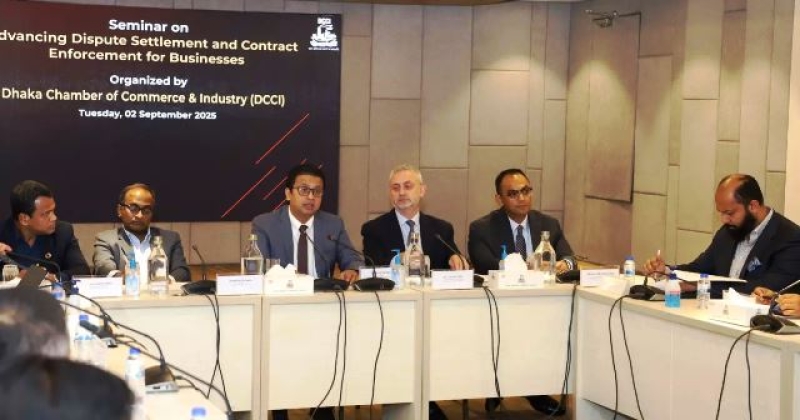- OIC Hails Belgian Declaration of Intent to Recognize Palestinian State |
- Bomb blast kills 15 near political rally in Pakistan |
- Corruption Persists Despite Uprising, TI Chairman Warns |
- Gaza Attacks Intensify as Disabled, Hungry Civilians Suffer |
- Stock indices edge up in first hour at DSE, CSE |
Businesses want special court to see 40 lakh trade disputes

Speakers at the seminar on Advancing Dispute Settlement and Contract Enforcement for Businesses organized by the Dhaka Chamber of Commerce & Industry (DCCI) on Tuesday
Speakers at a seminar highlighted that the delays in resolving trade disputes have significantly impeded foreign and domestic investment in Bangladesh.
They highlighted that the country's lower and higher courts are currently burdened with approximately 40 lakh pending cases, which contributes to a challenging business environment.
Speakers made the remarks while speaking at a seminar on ‘Advancing Dispute Settlement and Contract Enforcement for Businesses’ organized by the Dhaka Chamber of Commerce & Industry (DCCI).
The event, held on Tuesday (September 2), at the DCCI Auditorium, brought together government officials, foreign diplomats, and legal experts to discuss critical reforms needed to improve the business environment.
Commerce Secretary Mahbubur Rahman, the chief guest at the event, said that the legal system's slow pace is making it difficult to attract foreign investment.
“A draft of a new law to create commercial courts is expected to be finalized within the next month. The need for these new courts to be staffed by expert judges to ensure an efficient process,” he added.
The DCCI President, Taskeen Ahmed, stated that as economic activities in the country are growing significantly, disputes related to business contracts, investments, and intellectual property are also increasing.
"Currently, around 40 lakh cases remain unresolved in lower and higher courts. The prolonged judicial processes are hampering both local as well as foreign investment. Although the Arbitration Act was passed in 2001, it has not been implemented effectively,” he said.
He stressed the need for establishing a separate Commercial Court with the appointment of experienced judges and reforming the existing legal framework, which will accelerate the pace of trade and investment.
Michael Miller, Ambassador and Head of Delegation, the European Union in Bangladesh, said that in order to reform the legal process, the EU has been working closely with the government.
He expressed that the reform of the legal system will significantly improve the public’s quality of life.
Michael noted that as Bangladesh moves toward LDC graduation and pursues export diversification, the formation of Commercial Courts will be crucial to attract foreign investment. Such courts will facilitate both domestic and foreign investment expansion.
He hoped that the government would prioritize this issue for the greater interest of the economy.
He further stated that strengthening arbitration mechanisms will help reduce the current investment stagnation. He also added that European companies are keen to invest in Bangladesh’s logistics and shipping sectors.
Md. Abdur Rahim Khan, Additional Secretary (Export Wing), Ministry of Commerce & Vice Chairman, Export Promotion Bureau (EPB) said that delays in resolving trade disputes not only hinder FDI attraction but also negatively impact export expansion.
Besides, due to this, Bangladesh is gradually losing its place in global trade, he said. To overcome this, he proposed forming “legal institutions” outside traditional courts to resolve disputes through negotiations in a comparatively shorter time, he said.
Vikna Rajah, Co-Head, South Asia Desk, Rajah and Tann, Singapore, highlighted that due to strong legal structures, skilled human resources, strict law enforcement, and robust commercial dispute settlement mechanisms, Singapore continues to attract high levels of foreign investment.
He stressed the need for comprehensive legal reforms, the establishment of specialized commercial courts, and revision of the Arbitration Act in Bangladesh to attract more foreign investment.
Judge Tareque Muajjem Hussain, Special Officer (Additional District Judge), Special Officer to the
Chief Justice of Bangladesh (Additional District Judge), stressed the need to appoint experienced judges specialized in commercial disputes along with proper training, which will ensure smooth and faster dispute resolution.
Barrister Md. Sameer Sattar and Rizwan Rahman, former Presidents of DCCI, Md. Ariful Haque, Director General, Bangladesh Investment Development Authority (BIDA), K A M Majedur Rahman, CEO of Bangladesh International Arbitration Centre (BIAC), Md. Salem Sulaiman, vice president of DCCI, members of the Board of Directors, and stakeholders from relevant sectors were also present at the event. - UNB

